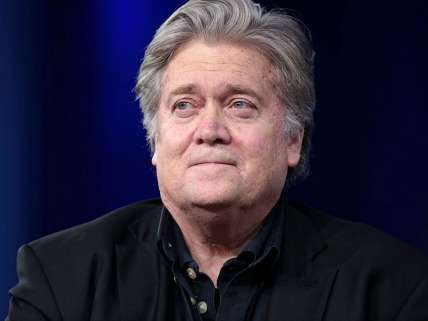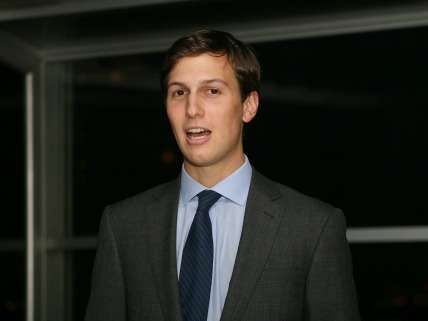Must We Take Sides in the 'Escalating Feud' Between Bannon and Kushner?
Choosing between the factions within the Trump administration is as much fun as choosing between Trump and Clinton.

The New York Times describes an "escalating feud" between two presidential advisers: chief White House strategist Steve Bannon, the former Breitbart News chairman, and Jared Kushner, Donald Trump's son-in-law. As with last year's contest between Trump and Hillary Clinton, it is hard to pick a side.
I know, from the way the article is framed, that I am supposed to favor Kushner over Bannon. I just don't understand why.
According to the Times, Bannon is "eager to close the nation's borders, dismantle decades of regulations, empower police departments and take on the establishment of both parties in Washington." I like half of those ideas and dislike the other half.
Kushner, by contrast, wants to "soften Mr. Trump's rough edges and broaden his narrow popular appeal after months of historically low poll numbers." I do not see much advantage in that.
The Times (along with The Washington Post) describes Kushner as "centrist-minded," which is supposed to be a compliment. It isn't. Notwithstanding Gary Johnson and Bill Weld's doomed attempt to rebrand libertarianism as a middle-of-the-road alternative to what the two major parties were offering, people described as "centrists" usually combine the worst aspects of left and right, united by an expansive view of government authority and a narrow view of individual rights.

In Kushner's favor, the Times says he was opposed to Trump's cruel, half-baked, unnecessary, and possibly unconstitutional ban on travelers from certain overwhelmingly Muslim countries. But Kushner also is "more inclined toward intervention in the Middle East, while Mr. Bannon would prefer that the United States remain as uncommitted as possible." Bannon "has argued that American interests are better served by not getting drawn any further into the quagmire of a civil war." Trump used to say that too (it was one of his few redeeming features), until he watched the news the other day.
The Times says the conflict between Bannon and Kushner is about "ideology" as well as "personality" and "ambition," but the article says very little about Bannon's views and even less about Kushner's. Bannon is an "edgy, nationalist bomb-thrower suddenly in the seat of power," while Kushner is "the polished, boyish-looking scion of New Jersey and New York real estate." Again, I know which one the Times prefers, but the preference seems pretty arbitrary, even at this superficial level. Why isn't Bannon "the wealthy former investment banker and Hollywood producer"?
The Post, which describes Bannon as "an unkempt iconoclast," says the "the ultimate argument against him," according to "one person with knowledge of the situation," is that "Bannon isn't making 'Dad' look good." There's a cause with the potential to unite half a dozen people.
The Post says Bannon "has cast the tensions as a confrontation between the nationalists and the liberal Democrats, whom he worries are eager to undercut the populist movement that helped lift Trump to victory." If nationalism means protectionism, a border wall, and mass deportations, I am against it. If it means a leeriness of foreign intervention, the United Nations, and the indiscriminate urge to copy the policies of supposedly more enlightened countries, that sounds pretty good to me. Populism likewise could connote suspicion of political elites, a bias toward local control, and opposition to crony capitalism, or it could mean catering to envy, ignorance, and bigotry. The difference is important.
On the flip side, it would be nice if the "liberal Democrats" within the administration were pushing free trade, civil liberties, and criminal justice reform, as opposed to increased federal spending, gun control, and government-mandated employee benefits. But if their main goal is softening Trump's "rough edges" and making him "look good," I have to assume they are resisting fulfillment of Trump promises that seem "extreme," such as real budget cuts, serious tax reform, and moving health care away from government control.
So far, it seems to me, the choice between the factions within the Trump administration is no less dispiriting than the choice between a Trump administration and a Clinton administration.
